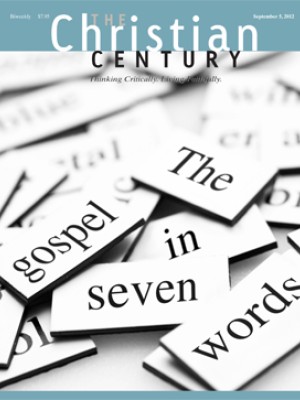Sunday, September 9, 2012: Mark 7:24-37
On August 2, 2010, a column in the New York Times struck a chord with a number of my colleagues—by the end of the day it was posted on the Facebook pages of more than 30 of them. These friends had one important characteristic in common with each other and with me. Each had graduated from seminary in recent years and each was serving in some ministry context, often in congregations. The first paragraph of reporter Paul Vitello’s “Taking a Break from the Lord’s Work” told the story:
The findings have surfaced with ominous regularity over the last few years, and with little notice: Members of the clergy now suffer from obesity, hypertension and depression at rates higher than most Americans. In the last decade, their use of antidepressants has risen, while their life expectancy has fallen. Many would change jobs if they could.
Read our latest issue or browse back issues.
Vitello describes the crisis of overwork among ministers and the prevalence of “boundary issues”—problems they have when they are too easily overtaken by the urgency of other people’s needs. How many weekends have been swallowed up by parishioners’ birthday parties, graduations and anniversary celebrations? How many vacations have been delayed or cut short by situations that simply couldn’t wait?
Perhaps our overwork and boundary issues have something to do with our model for ministry. In Mark’s Gospel, Jesus pursued his vocation at a breakneck pace; he was always surrounded by crowds of people who needed something from him. Even when he left the crowds behind and escaped the Pharisees’ provocations, Jesus had to manage a group of disciples who always seemed a step or two behind. Mark’s Jesus was relentlessly driven by his mission to proclaim and embody God’s kingdom. He rarely took a break from the Lord’s work.
When Jesus did seek solitude, the results were disastrous. After arriving in the coastal region of Tyre (a beach vacation?), Jesus tried his best to escape notice by “closing the blinds” and keeping a low profile. No such luck. In this predominantly gentile region he was “immediately” (Mark’s favorite pacesetting word) discovered by a gentile woman, a mother in great need. The vacation was in danger of ending abruptly, and Jesus resisted with harsh words and even name-calling.
In pastoral care class we seminarians learned this well-worn aphorism: when the shepherd is not fed, the shepherd eats the sheep. I know that when Jesus refers to children and dogs, we are meant to think of the children of Israel in contrast to the pagan gentiles. But I can’t help thinking of the intimate setting and the personal impact of these words. Could it be that Jesus was demanding, just this once, the opportunity to eat before he ministered? In the very next chapter, Jesus fed a crowd of 4,000 people who had not eaten for three days. Surely he was hungry then too, but there is no reference to him sharing the meal.
The fiery words of Jesus here, as off-putting as they may be, permitted an honest rejoinder from the gentile woman. His words provided an opening for a bold response that proved transformative. It may be, as many suggest, that the woman called Jesus back to the practice of his ministry, but I’m not so sure he had left it behind. Despite the high-gloss shine with which Jesus is often painted, his humanity did not diminish his ability to proclaim and embody God’s kingdom: his humanity enabled his ministry.
So does ours. This lesson can be particularly hard for overworked clergy to learn and appreciate. Easily overtaken by the urgency of other people’s needs, we can be indifferent to our own needs, or to those of the ones closest to us. Too often I trick myself into believing that my extra workload is admirable sacrificial service, but it’s not. Instead it creates unhealthy dependence and unrealistic expectations.
This became clear to me when a good friend in a previous congregation confronted me with this assessment: “When I see you working all the time, I become convinced that I’m supposed to do the same thing.” Whether we embrace the fact or deny it, our lives are models for others. When we acknowledge our human limitations, we grant others permission to do the same. When we display the full human range of our emotions and responses, we invite others to more authentic living.
Jesus’ words to the Syrophoenician woman may not represent exemplary pastoral care. But they do perfectly represent his state of mind and emotion in that moment. They were deeply personal words of frustration and need, and they opened a door to sincere dialogue with a fellow human being in need.
One day, when I was an undergraduate in Stanley Hauerwas’s Christian ethics class at Duke Divinity School, he told the class that the foundational ethical obligations of a Christian could be comprehensively summarized by the simple command to tell the truth. I believe this, yet often I misrepresent myself as a tireless and irreproachable servant of God who is always overflowing with energy and Christian charity. What I am instead is a flawed and fatigued fellow traveler. This is the truth as well as the starting point for genuine transformation.
After leaving Tyre, Jesus performed another miracle. But before healing a man who was deaf and unable to speak, Jesus looked up to heaven and sighed. In that sigh I can hear his humanity. I can sense the exhaustion of the one who only appears tireless. I can identify with that sigh—and take a little time off.





